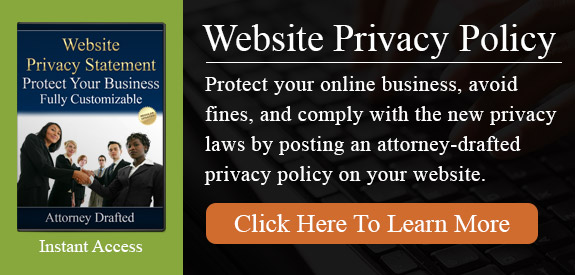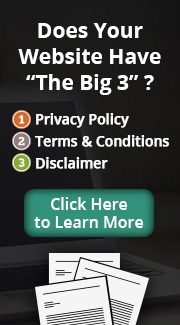 Auditing your website or blog is one of the most important things you can do to protect yourself from business and legal problems.
Auditing your website or blog is one of the most important things you can do to protect yourself from business and legal problems.
Websites are unique pieces of property in the business world. Unlike the situation that exists in brick-and-mortar environments, website owners typically do not own significant sections of their online properties.
Many sites maintain outdated privacy policies and poorly drafted terms and conditions, which they fail to post properly. Opportunities for fines and legal problems—up to and including lawsuits—are waiting to be discovered on many websites and blogs.
Here is a website audit checklist to review for potential legal problems:
1. Privacy Policy—Make sure that you are using our attorney-drafted privacy policy posted in a clear and conspicuous position that meets our posting requirements. If you forgoe our privacy policy in favor of another, you should ensure the policy was drafted by an experienced Internet law attorney and meets current state and federal legal requirements.
2. Terms and Conditions—You should maintain a professionally drafted website terms and conditions agreement that provides protection in its relationships with your visitors, and customers (users). And to be enforceable, your agreement must be agreed on by your users. Merely posting it on your website will generally not be sufficient enough to protect you.
3. Online Behavioral Advertising (OBA) Disclosure—If your website or blog contains advertisements from Google AdSense, Bing, or Yahoo Advertisements, or similar advertising that collects a user’s browsing activity over time, you must post an “Online Behavioral Advertising Disclosure” on every page that displays those advertisements. See chapter 12 for details and an OBA disclosure that you can use.
4. Disclosure of Material Connection—When you receive any type of compensation for endorsing, recommending, or advertising another company’s products or services, the FTC requires that it post a “Disclosure of Material Connection Notice” in a conspicuous spot on its website or blog. This requirement extends to any affiliate programs to which you belong and that you promote.
5. Is anything downloadable from my website or blog?—This includes music, documents, and videos. If so, do you own the content or properly license it? If the answer to both questions is “no,” you could face copyright infringement claims from the parties that do own those properties.
6. What is the source of all graphics, clip art, and photographs?—This content is protected by copyright under intellectual property law. Has the copyright been transferred to you? If not, have you obtained a license, and is that license transferable? Do any limitations on the license exist? Limitations are usually in place unless you purchase full rights to the work. You must work out these issues or possibly face a copyright infringement claim.
7. What is the source of written content on your website?—A website’s or blog’s written content is protected by copyright under intellectual property law. Do you own the rights to all of the content on your site? If not, have you obtained a license, and is that license transferable? Do limitations on the license exist? Limitations are usually in place unless you purchased full rights. You must work out these issues or possibly face a copyright infringement claim. Run some or all of the content on your site through Copyscape.com. You will quickly learn whether the content is unique, whether it consists of common Private Label Rights (PLR) articles, or whether it has been plagiarized or possibly stolen from another website.
8. Does the website or blog contain testimonials, in text, audio, or video form?—If so, do you have written consent to use the testimonials? If not, can you acquire that consent?
9. Was the site designed by an employee of the site owner? If not, you must identify the third-party designer and obtain a copy of the agreement between the parties. This agreement details the site’s copyright ownership. Make sure that the site owner owns the copyright, and that the copyright can be transferred without restriction.
10. Do you need cyber liability insurance? If your e-commerce website maintains any kind of risk due to the type of business that it operates, or if you could lose users’ or customers’ personal information to a security breach, cyber liability insurance is probably a good idea.
This list is not exhaustive. Instead, it identifies just some of the potential legal problems that might arise down the road. The important thing is to recognize that an online business that operates via website or blog maintains many of the same requirements (and poses many of the same problems) as traditional brick-and-mortar businesses. Intellectual property claims are a big problem for online businesses.


